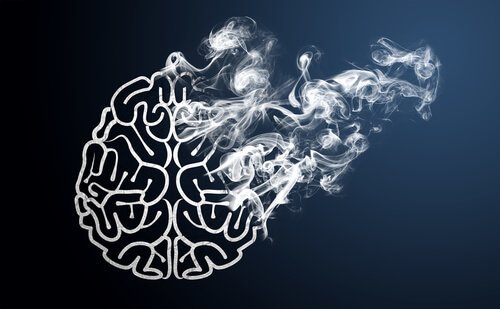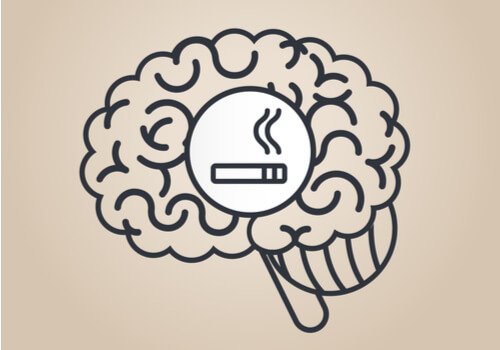(Stillness in the Storm Editor) Nicotine is a chemical, like THC or CBD, that interfaces with a naturally occur system in the brain in charge of rewards, specifically associated with exploration. When we crave newness, excitement, and fun, the exploratory system is active. It affects the same centers of the brain that Acetylcholine works with, the neurotransmitter that is active when we move or use our motor functions. That feeling of anxiety and increased energy you feel when you decide to do something, called an affective response, is that motive center in action.
The system that nicotine acts on is apparently an ancient system that is very important during the initial phases of life when the ego-boundary becomes prominent through play. That is, an infant begins to understand themselves as separate from their environment through play, which allows the child to carve out a unique sense of identity. This natural process is reinforced by neurological processes that produce reward neurotransmitters, such as arginine vasopressin, beta-endorphin, adrenocorticotropic hormone, and cortisol. This means that play and exploration, exposure to novelty, helps regulate the personality and psyche. It is theorized that one cause of mood disorders and borderline personality disorder is a lack of play and nurturing (neglect) during childhood.
As adults, the same psyche regulation processes are at work, but have changed in expression. The neurology isn’t totally understood yet, but it is known that people need to regulate their sense of self, their ego or persona, through value-oriented activities. One of those values is fun, exploration, and novelty seeking.
Simply put, one of the ways we maintain good mental health is by having new experiences. Everyone craves new things. When we have too much monotony in our lives, like working in a cubicle staring at a computer screen for 8 to 10 hours a day, we start to feel anxious, unhappy, and motivation drops. Part of the reason this occurs is that we receive emotional rewards for our activities if they are valued, stimulating and engaging. If we don’t account for this deep need to explore and experience new things, we feel moody, unmotivated, and lack enthusiasm, amongst other things depending on severity.
The natural way to satisfy this urge is to go do something different.
Mindfulness meditation is one method of satisfying this need, which is the act of focusing your mind on something like your breathing for a short period of time. The shift from one focus to another reorients the neurological process, and increases your sensitivity to the environment, thereby providing you emotional boosts. This is called fractionation in Neuro Linguistic Programming. Going for a walk can also help.
The key concept is novelty and engagement. If you can do something totally new that also engaged you deeply, makes you think, sparks your creativity, and has some physically active component, the play centers of the brain activate and you feel deeply fulfilled.
The need for play or breaks to improve productivity is well established, as Illich’s Law about Negative Productivity outlines. Illich’s law seems to agree with the diminishing returns effect observed by neurologists—that the longer we do something, even if we love it, we’ll feel less stimulated from it, unless we work in regular breaks. Consider this example, if you ate the same dinner for a year, even if it was one you loved, you’ll probably dislike it by the end.
Nicotine from smoking or vaping, hijacks the mechanisms in charge of play desire and reward. Vaping or E-cigarettes can have a stronger impact because they often deliver a larger dose of nicotine.
Buy Book Affective Neuroscience: The Foundations of Human and Animal Emotions (Series in Affective Science)
Here’s how it works.
Normally, after you’ve been doing some activity for too long, you start to feel anxious. You need a break to get your mind on something new and engaging. That feeling of anxiety and even irritability is in effect a signal from your brain to get up and go play, go learn something new or engage yourself. If you act on that desire, you’ll improve your mood, enhance your knowledge, and possibly get some exercise—if your chosen break involves physical motion. If the activity you choose was valuable to you, like learning a new skill, or reading a book you’re really into, the feeling of mood improvement lasts throughout your day, even into the next day if the activity was highly engaging. This is arguably the best option, as you grow in knowledge and express your values, which is precisely the personality regulation you need to stay happy, fulfilled, and creative in life.
If you’re a smoker or vape, the process is altered.
That feeling of anxiety, as a smoker, triggers a desire to smoke or vape. This rewires your play mechanism. Instead of that feeling triggering you to get up and go do something fun and engaging, you just take a pull off your vape instead. The nicotine provides almost all the same neurochemical effects as an engaging activity. But the problem is you didn’t actually do anything new and engaging. You didn’t actually explore anything, and part of you knows that. Eventually, the desire to play and engage gets completely replaced by smoking, as the nicotine effect produces stronger rewards than normal play, biochemically. At this point, the high you feel from the nicotine disincentivizes normal play.
Ever notice that smokers tend to smoke when they’re dealing with a new or stressful experience? I suspect this because they’ve rewired their brain and they need the overly intense nicotine high to activate their exploration impulses, so they can process the information in this new event properly.
The reward hormones from exploring the world and doing something new are supposed to help your brain rewire itself in relation to the activity. For example, if you learning how to garden, and you’ve never done it before, you’re brain is going to be flooded with play/exploration chemicals that help with the rewiring process. Neuroplasticity speaks this quite well. But, again, with nicotine, unless you’re actually engaged in a new activity in conjunction with the consumption of the drug, you’re brain is being rewired in probably not so healthy ways.
For instance, if you smoke while watching TV, your brain is being rewired to become a better TV watcher.
In closing, with any addiction, it’s important to realize that there’s a deep need being satisfied through the vice. Physical addictions take hold because values within us aren’t being expressed. The addiction acts as a temporary solution to solve a much deeper problem. In this case, we live in a world that robs us of play and exploration. And what’s worse, many of the playful activities we do engage in aren’t all that novel. If the way you satisfy your urge for exploration is to flip on Netflix for 5 hours, then this isn’t stimulating enough to satisfy your wanderlust.
The effects of nicotine, once properly understood, reveal a deep need within us as living creatures. I would argue, one of the challenges of life is to stay engaged, to find ways to be excited, enthusiastic, and fulfilled. Simply exploring new things is an easy way to do this, but in our modern world, this is becoming harder and harder.
Don’t fall for the modern trap of preprogrammed prepacked engagement. Go do something totally new to you. Put that tablet down, stop scrolling through social media as a way to take a break and get your play. It will feel strange at first, especially if these play centers haven’t been used for a long time. But once you let yourself dare to dream of unseen vistas, adventures, and avenues of engaging stimulation, you’ll give yourself a major mood boost and life will be all the sweeter.
Who doesn’t want that?
– Justin
(Exploring your Mind) Nicotine is a substance that triggers an artificial sense of well-being. At the same time, it makes the brain age prematurely and this, in turn, affects some intellectual abilities.
Related Junk Food Triggers a Type of Addiction That Unleashes Withdrawal Symptoms When You Try to Quit
by Staff Writer, March 19th, 2019
For a long time, many people ignored the fact that nicotine use can lead to addiction. However, scientists have discovered that this substance can lead to a dependence similar to hard drugs such as cocaine or amphetamines.
Nicotine is able to modify the brain. Through complex mechanisms, it provokes changes in the brain’s rewards system. In other words, it creates a pleasurable sensation that the brain starts to become dependent on. This makes the body need the substance.
Only the smoker can decide if they’ll quit smoking. The decision and process are both difficult, but not impossible. The following information is simply meant to illustrate the effects of nicotine on the brain so that smokers aren’t taken by surprise.
“Take care of your body. It’s the only place you have to live.”
-Jim Rohn-
How nicotine operates in the brain
When a person consumes nicotine, a group of the brain’s acetylcholine receptors is activated. These receptors cause dopamine to be released.Dopamine is a neurotransmitter linked to feelings of motivation and pleasure. In short, smoking induces a chemically-induced feeling of well-being.
The body quickly carries nicotine to the brain. It’s estimated that it only takes between ten and fifteen seconds for nicotine to pass from the lungs through the bloodstream. Studies indicate that any substance that we smoke is potentially addictive, precisely because of how quickly the feeling of well-being is generated.
The brain has its own “nicotine”: acetylcholine. It also has its own marijuana, morphine, heroin, etc. This means that the brain can mimic the effects of these substances without consuming them. This happens when we have positive experiences, such as achieving a goal, laughing, or breaking a record. But if we use chemicals to artificially trigger the effects of dopamine, we run the risk of becoming addicted.

Nicotine addiction
When you consume nicotine or another similar drug, the brain quickly reaches a state of well-being. If this occurs frequently, the brain becomes less and less able to generate pleasurable sensations that aren’t associated with the consumption of the substance. In other words, it becomes more difficult to enjoy the same satisfaction through natural means.
At the same time, the brain begins to crave that state of well-being relatively often. Due to this, uncomfortable symptoms such as restlessness, nervousness, and anxiety may manifest, which leads the person to consume to put an end to them.
This doesn’t happen when the brain experiences pleasure naturally. In addition, over time, the brain becomes conditioned. It anticipates a feeling of well-being, which leads to an uncontrollable smoking habit.
The harmful effects of smoking
The production of cigarettes is in the hands of large multinational companies. They’ve spared no effort in studying consumer behavior and promoting addiction. They regulate the amount of nicotine in each cigarette so that dependence is maintained. They make packs of 20 cigarettes because studies have shown that any greater amount per day generates displeasure. Everything is carefully planned.

Nicotine makes the brain age faster. It decreases the brain’s ability to solve problems, make decisions, learn, and control impulses. This substance leads to the weakening of the brain’s orbitofrontal cortex. It also makes the consumer become more vulnerable to other addictions.
Quitting smoking isn’t easy, precisely due to everything we explained above. To do it, a person needs a strong will and an effective strategy. It’s best to stop smoking completely, not gradually. At the same time, creating a system of incentives and reinforcements can prove helpful.
Buy Book Medication Madness: The Role of Psychiatric Drugs in Cases of Violence, Suicide, and Crime
Stillness in the Storm Editor: Why did we post this?
Psychology is the study of the nature of mind. Philosophy is the use of that mind in life. Both are critically important to gain an understanding of as they are aspects of the self. All you do and experience will pass through these gateways of being. The preceding information provides an overview of this self-knowledge, offering points to consider that people often don’t take the time to contemplate. With the choice to gain self-awareness, one can begin to see how their being works. With the wisdom of self-awareness, one has the tools to master their being and life in general, bringing order to chaos through navigating the challenges with the capacity for right action.
– Justin
Not sure how to make sense of this? Want to learn how to discern like a pro? Read this essential guide to discernment, analysis of claims, and understanding the truth in a world of deception: 4 Key Steps of Discernment – Advanced Truth-Seeking Tools.
Stillness in the Storm Editor’s note: Did you find a spelling error or grammar mistake? Send an email to [email protected], with the error and suggested correction, along with the headline and url. Do you think this article needs an update? Or do you just have some feedback? Send us an email at [email protected]. Thank you for reading.
Source:
https://exploringyourmind.com/nicotine-affect-brain/

Leave a Reply